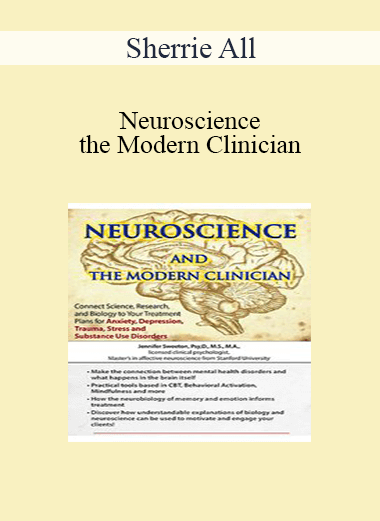Sherrie All – Neuroscience and the Modern Clinician: Connect Science, Research, and Biology to Your Treatment Plans for Anxiety
Sherrie All – Neuroscience and the Modern Clinician: Connect Science, Research, and Biology to Your Treatment Plans for Anxiety
[Instant Download] – You will receive instant download access after the purchase
Original price was: $219.99.$43.00Current price is: $43.00.
80% Off


Secure Payments
Pay with the worlds payment methods.

Discount Available
Covers payment and purchase gifts.

100% Money-Back Guarantee

Need Help?
(484) 414-5835
Share Our Wines With Your Friends & Family
Description
- Faculty:
- Sherrie All
- Duration:
- 6 Hours 11 Minutes
- Format:
- Audio and Video
- Copyright:
- Sep 07, 2018
Description
| Manual – Neuroscience and the Modern Clinician (3.33 MB) | 68 Pages | Available after Purchase |
Outline
Neuroscience can enhance therapy.
Clinicians need to know about the nervous system.
- Brain basics – structure and function
- 12 structures you need to know
- How the brain organizes
- Key pathways involved in common disorders
- Pain pathway
- Reward pathway
- Fear-stress pathway
- Default Mode and Task Mode Networks
- Impact of relationships on our nervous system
- Mirror neurons
- Oxytocin
- Simple explanations and 3-D brain model for clients
- How neurobiology can help you to determine treatment methods and set goals
- ”Our brains” and objectivity in therapy
- Limitations of “brain-based” approaches
There is potential for change.
- Hype vs. the “two-way” street of brain plasticity
- Physical vs. functional change – structural or at the synapse
- The strength of connections
- Timeframes for change
- How neuroplasticity can help you foster change
- Explaining neuroplasticity to clients
There are treatment strategies and interventions for common disorders. Neuroscience is behind them.
Anxiety
- The neural bases of threat processing
- Key CBT concepts and techniques
- Combining cognitive work with:
- Mindful awareness of emotions
- Get physical – how using the body can ease anxiety symptoms
- Breathing exercises and relaxation training
Depression
- The depressed brain – structural and functional
- The neural interrelationships of depression and anxiety
- Behavioral activation – get active!
- Mindfulness as an adjunctive approach
- Compassion, gratitude and depressive symptoms
Trauma
- Malleability of memory: implications for trauma treatment
- How childhood trauma changes the developmental trajectory of the brain
- Polyvagal Theory, trauma and the body – the research
- Imagery techniques – imaginal exposure
- Grounding and interoception
Stress
- How stress impacts the nervous system
- The adverse effects of long-term stress exposure
- The role of the stress/fear pathway
- CBT-based coping skills for stressful situations
Substance use disorders.
- Brain areas involved in addiction
- Pleasure and pain pathways
- Prefrontal connections and judgement
- How addiction can change the brain
- Motivational Interviewing
- Contingency management
There are limitations to neuroscience research and treatment risks.
- fMRI imaging – blood flow vs. neuronal activity
- How only looking at brain activations produces an incomplete picture
- Neuroscientific studies, sample size, and validity
- Animal research – directly applicable to humans?
- Psychotherapeutic techniques – specific limitations and risks
Faculty

Sherrie All, Ph.D. Related seminars and products: 5
Chicago Center for Cognitive Wellness
All is a PhD. Neuroscience, cognitive rehabilitation and brain health are what I specialize in. She is the owner and director of the Chicago Center for Cognitive Wellness, a group neuropsychology practice that offers assessment and treatment services for people affected by cognitive decline. Dr. All is a leader in the field of brain health. Her work in this area earned her the 2010 Sharpbrains Innovation Award for Most Innovative Mental Health Program as well as the attention of media outlets. The New Yorker. And. There is a business in Chicago.
Dr. All trains other professionals in how to use cognitive rehabilitation interventions in their practice. She gives a detailed understanding of the brain and brain-behavior relationships. Dr. All is currently giving a keynote address. There are choices you can make everyday to lower your risk for dementia. It is possible to promote a popular understanding of the scientific theory of cognitive reserve to empower people to care for their brains. She speaks regularly on the topics of brain health, cognitive rehabilitation and interventions for early-stage dementia, as an invited speaker for the Lifetime Education and Renewal Network of the American Society on Aging. Dr. All uses fMRI andEEG to look at cognitive deficits.
Speaker disclosures.
The owner of the Chicago Center for Cognitive Wellness is Sherrie All. She is paid by PESI, Inc.
There is no relevant non-financial relationship to disclose.
Delivery Method
– After your purchase, you’ll see a View your orders link which goes to the Downloads page. Here, you can download all the files associated with your order.
– Downloads are available once your payment is confirmed, we’ll also send you a download notification email separate from any transaction notification emails you receive from nextskillup.com .
– Since it is a digital copy, our suggestion is to download and save it to your hard drive. In case the link is broken for any reason, please contact us and we will resend the new download link.
– If you cannot find the download link, please don’t worry about that. We will update and notify you as soon as possible at 8:00 AM – 8:00 PM (UTC 8).
Thank You For Shopping With Us!
OUR BEST COLLECTION OF COURSES AND BOOKS





Reviews
There are no reviews yet.